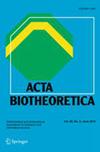Integration of Heterogeneous Biological Data in Multiscale Mechanistic Model Calibration: Application to Lung Adenocarcinoma
IF 1.4
4区 生物学
Q4 MATHEMATICAL & COMPUTATIONAL BIOLOGY
引用次数: 6
Abstract
Mechanistic models are built using knowledge as the primary information source, with well-established biological and physical laws determining the causal relationships within the model. Once the causal structure of the model is determined, parameters must be defined in order to accurately reproduce relevant data. Determining parameters and their values is particularly challenging in the case of models of pathophysiology, for which data for calibration is sparse. Multiple data sources might be required, and data may not be in a uniform or desirable format. We describe a calibration strategy to address the challenges of scarcity and heterogeneity of calibration data. Our strategy focuses on parameters whose initial values cannot be easily derived from the literature, and our goal is to determine the values of these parameters via calibration with constraints set by relevant data. When combined with a covariance matrix adaptation evolution strategy (CMA-ES), this step-by-step approach can be applied to a wide range of biological models. We describe a stepwise, integrative and iterative approach to multiscale mechanistic model calibration, and provide an example of calibrating a pathophysiological lung adenocarcinoma model. Using the approach described here we illustrate the successful calibration of a complex knowledge-based mechanistic model using only the limited heterogeneous datasets publicly available in the literature.异构生物学数据在多尺度机制模型校准中的整合:在肺腺癌中的应用
机械模型是用知识作为主要信息源,用完善的生物和物理定律来决定模型内的因果关系。一旦确定了模型的因果结构,就必须定义参数,以便准确地再现相关数据。在病理生理学模型的情况下,确定参数及其值尤其具有挑战性,因为用于校准的数据很少。可能需要多个数据源,并且数据可能不是统一的或理想的格式。我们描述了一种校准策略,以解决校准数据的稀缺性和异质性的挑战。我们的策略侧重于初始值不易从文献中获得的参数,我们的目标是通过相关数据设置的约束进行校准来确定这些参数的值。当与协方差矩阵适应进化策略(CMA-ES)相结合时,这种循序渐进的方法可以应用于广泛的生物模型。我们描述了一种逐步、综合和迭代的多尺度机制模型校准方法,并提供了一个校准病理生理肺腺癌模型的例子。使用这里描述的方法,我们说明了仅使用文献中公开可用的有限异构数据集成功校准复杂的基于知识的机制模型。
本文章由计算机程序翻译,如有差异,请以英文原文为准。
求助全文
约1分钟内获得全文
求助全文
来源期刊

Acta Biotheoretica
生物-生物学
CiteScore
2.70
自引率
7.70%
发文量
19
审稿时长
3 months
期刊介绍:
Acta Biotheoretica is devoted to the promotion of theoretical biology, encompassing mathematical biology and the philosophy of biology, paying special attention to the methodology of formation of biological theory.
Papers on all kind of biological theories are welcome. Interesting subjects include philosophy of biology, biomathematics, computational biology, genetics, ecology and morphology. The process of theory formation can be presented in verbal or mathematical form. Moreover, purely methodological papers can be devoted to the historical origins of the philosophy underlying biological theories and concepts.
Papers should contain clear statements of biological assumptions, and where applicable, a justification of their translation into mathematical form and a detailed discussion of the mathematical treatment. The connection to empirical data should be clarified.
Acta Biotheoretica also welcomes critical book reviews, short comments on previous papers and short notes directing attention to interesting new theoretical ideas.
 求助内容:
求助内容: 应助结果提醒方式:
应助结果提醒方式:


